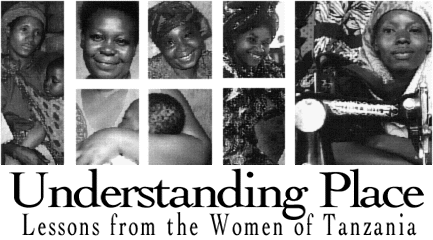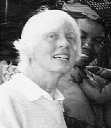SPRING 1998
Volume 15, Number 3

by Susanna Sonnenberg
Photos by Katherine Weist
Katherine Weist knew one thing for certain when she was a small girl on her family’s farm in Ohio. “I remember looking over my father’s beautiful fields of green wheat,” she says, “and thinking, ‘It’s an ocean, and a boat’s going to come and I’m going to leave this place and I’m never coming back.’” That landlocked dreamer became Professor Katherine Weist who has taught anthropology at The University of Montana for twenty-nine years. She has traveled the world extensively, beyond the tourist’s domain of picturesque rail journeys and audio-guided museum tours. She has traveled the people.
 |
|
|
The women of Tanzania are Weist’s most recent expedition. Located on the eastern coast of central Africa, Tanzania is known throughout the world for its celebrated Serengeti Plain, the lush veldt of fabulous animals that attracts thousands of tourists each year. But Weist did not spend her nine months in Tanzania squinting through binoculars.
Weist, who defines herself as a social cultural anthropologist, traveled to Tanzania in the fall of 1995 to investigate her hypothesis that African women fare better in urban settings than in rural situations. Supported by a sabbatical and a university research grant, the professor lived there for almost a year.
Weist’s interest in African women grew out of previous trips to Nigeria and Botswana. “One of the things that always interested me when I was in Nigeria and Botswana was the women,” says Weist, sitting in her campus office, its walls transformed from institutional mundane by bright artifacts from her foreign homes. “The women are lively; they seem to have a real secure sense of self; they’re very hard-working; they have very large families. They don’t hold positions of political power, but they are extremely essential in keeping the economy going.”
Since plenty of research existed on women in rural areas, Weist focused on women in a small town setting. “I hypothesized that a small town would be better for women because they have all the amenities of running water and electricity, they have markets that are close by, they can work as market women or in trades, and there’s not as much crime.”
The Women of Tabora
Weist chose Tabora, an inland town with a population of about 100,000. “I wanted to go to what Tanzanians would consider a small town, and look at the role women had there and how they thought about a sense of place.”
Tabora, populated by merchants and government workers, is not shockingly poor, and absent are the slums, shantytowns and toxic air pollution that make Tanzania’s major city, Dar es Salaam, virtually unlivable. But the government jobs so essential to Tabora have been drying up over the last twenty years, leaving the city forgotten and crumbling. “There wasn’t a lot of commercial activity.” Weist explains, “There was a market, one bank and a decaying bus area. That was about it.”
Understaffed and ill-equipped, hospitals, schools and government offices are falling apart. Women who work as nurses cannot protect themselves from disease because the hospitals cannot afford to buy rubber gloves. The situation is even more treacherous for women patients. “In 1991, eight women died in childbirth in Tabora’s regional hospitals,” Weist says. “In 1995, thirty-one women died, which does not even include the number of infants lost. There are no vitamins, the hospital has no real prenatal care. If you go to the hospital to have a baby and you have a problem, you die.” She remembers the local government office. “There are no telephones, no supplies, nothing. There was no typewriter because they can’t afford the ribbon.”
Although the town has electricity, running water and marketplaces, it is virtually isolated. Bus companies won’t invest in Tabora, opting to put their air-conditioned buses on the northern roads that take tourists to safaris or Mount Kilamanjaro. And a journey of only a few hundred miles on the region’s rutted roads can take nearly two days. Locked inland like the fictional Macondo in Gabriel Garcia Marquez’s Hundred Years of Solitude, Tabora is a town that people leave.
Professor Weist chose to come. “I thought it was a nice town,” she says. “It had lots of mango trees, it was very green, it was relatively easy to move around, the housing wasn’t too bad, and the people were exceptionally friendly.” Then she began interviewing the women. She found that “they hated the town, they just thought that it was a horrible place.”
Most of the women Weist interviewed said they would rather live elsewhere, in Arusha for example, where the residents had money. “I talked to a lot of women who are working in markets, they were trading, selling cakes on the road, little tea stands, and they said, ‘I really want to work, we have to support our family. We’re trying, but people don’t have money here.’ They’re caught in a terrible situation; they’re very angry, unhappy people,” she says.
Toward A Sense of Place
Gradually, Weist’s research shifted. “What I got into learning about was people’s sense of place and how where you are living has a big impact on what you can do, upon the facilities that are there, your movement, how viable your business is.” The way these women related to place struck a chord in Weist, who grew up hating her isolated farm, dreaming of places she had visited. She elaborates: “A sense of place is not in terms of just one place. It’s always comparative. It’s how you feel about this place compared to another place.”
Weist determined that four things matter to the Tanzanian women as they defined a sense of place. “These women had clear ideas as to what makes a good place,” Weist says. It has to do with business opportunities, the presence of family and friends, the climate and how well they knew the place. These were the four things they brought up all the time.
“Place for many Americans has to do with geography. What it looks like. What it smells and feels like. It has to do with people and whether or not the people are nice, easy to get along with.” It also, Weist says, has to do with economic status: “When you’re feeling economically unproductive, a place begins to feel like a bad place.”
Weist plans to turn her attention to Montanans and how the economy, community, climate and the presence of family affect their sense of place. “We all have a sense of place. We all talk about place. We all live in a place. We have deep feelings about place. It’s the women in Tanzania who told me about this.” M
Susanna Sonnenberg regularly reviews movies and theater for the Missoulian.